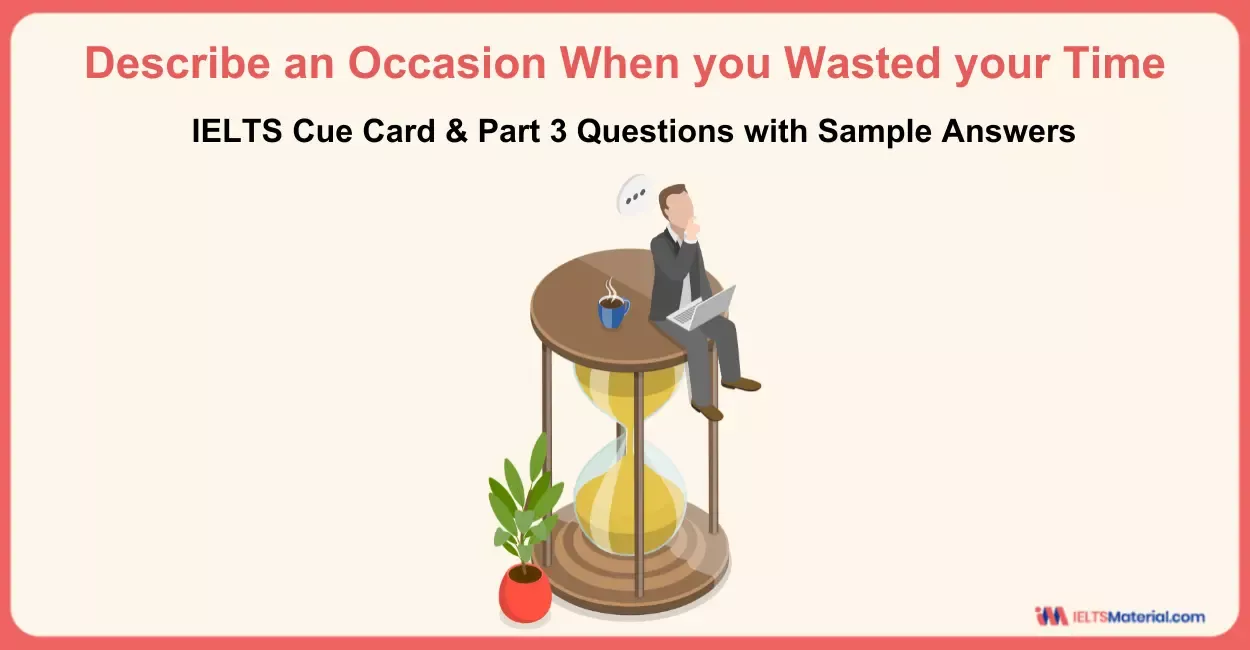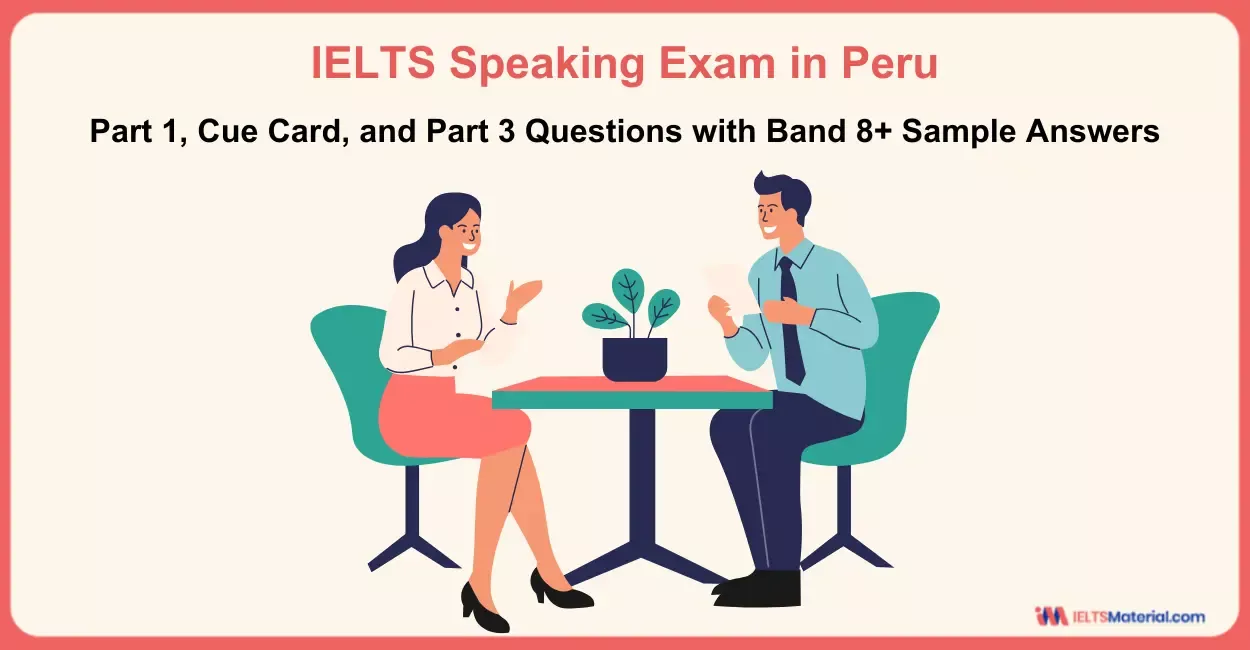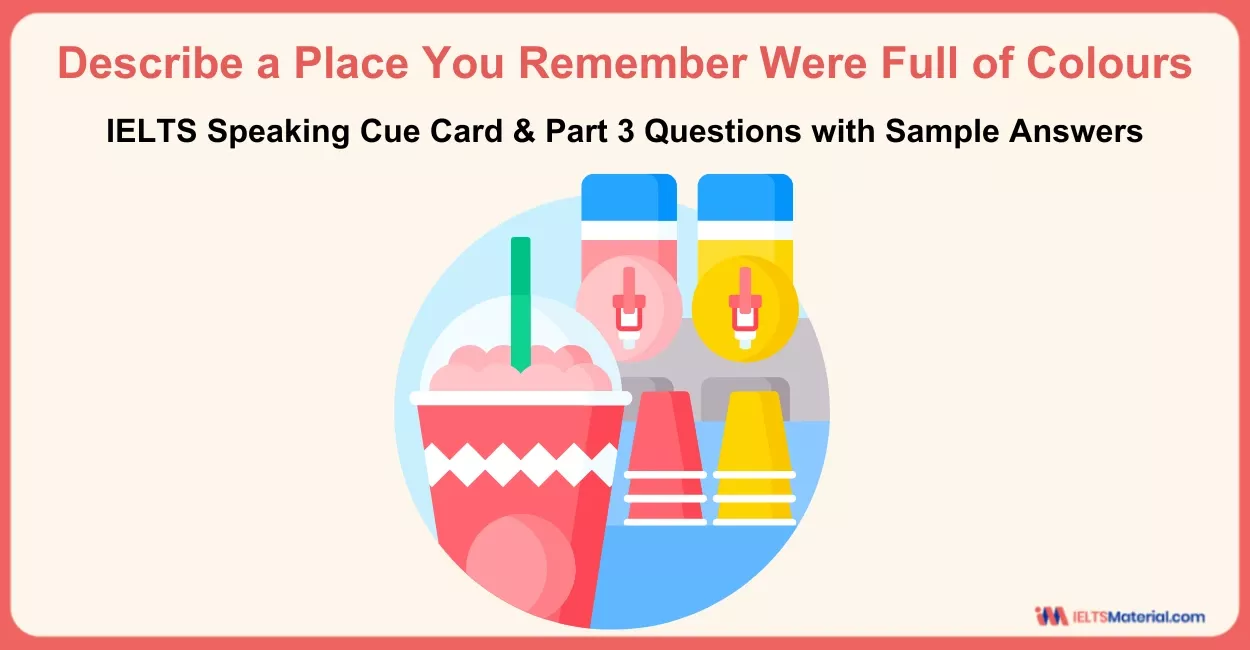IELTS Speaking Exam in Peru - Part 1, Cue Card, and Part 3 Questions with Band 8+ Sample Answers
Prepare yourself with the IELTS Speaking Exam in Peru by engaging with Part 1, Cue Card, and Part 3 questions. Discover band 8+ strategies along with sample answers and vocabulary words to enhance your fluency, pronunciation, and lexical resources.
Table of Contents

Limited-Time Offer : Access a FREE 10-Day IELTS Study Plan!
To appear for the IELTS Speaking Exam in Peru, you need to first build confidence as it can be perceived as a nerve-racking experience. With the right strategy and understanding of the different sections, getting a band score of 8+ is achievable. The IELTS Speaking Test is an integral part of the IELTS Exam that assesses your ability to express your thoughts clearly, fluently, and naturally in English. Therefore, learn how to support your answers with appropriate examples, idioms, and linking words and make your responses sound refined.
Connect with our band 9 IELTS Trainers to crack your IELTS Speaking in no time! Book a FREE Demo.
How to Score a Band 8+ in the Parameters for IELTS Speaking Exam in Peru?
Scoring a higher IELTS Band Score of 8+ in the IELTS Speaking Exam in Peru is possible if you practice consistently and prepare diligently. Remember that the speaking section is about clarity, confidence, and natural communication. Therefore, you must be aware of how to elevate your preparation for each parameter based on which you will be marked. Below is the table which will give you in-depth information about the strategies to score a band 8+ in each criteria.
|
Parameter |
Description |
|
Fluency & Coherence |
|
|
Lexical Resource |
|
|
Grammatical Range & Accuracy |
|
|
Pronunciation |
|
Want to learn Useful Idioms for IELTS Speaking? Check out the video below!
Part 1 Questions with Sample Answers for the IELTS Speaking Exam in Peru
The IELTS Speaking Part 1 is the most crucial section of the Speaking exam. In this part, you have to communicate in a fluent, natural, and expressive manner. Your answers should demonstrate your proficiency level in terms of using varied vocabulary, correct grammar, and pronunciation. Mastering Part 1 provides you with the needed confidence for the remaining part of the test. Let’s dive into the questions now.
1 What is your full name?
My name is “Naleen Dey”
2 Can I see your ID?
Sure, you can
3 Where are you from?
I’m from the dream city Mumbai also known as the financial capital of India. Mumbai was formerly called Bombay and is also the capital of the state Maharashtra which is also the biggest metropolis of this state
4 Where do you live now?
Currently I’m living in the city named Kolkata which is considered one of the largest city and also is among the top metro cities in India and is capital for West Bengal. The city has earned the nickname ‘city of joy’ because of its soulful culture and heritage
-
Hometown
1 How long have you been living there?
I was born and raised in Cusco. I’ve lived there for my entire life, except for when I went to Lima, the capital city, to study for my Bachelor's Degree. After that, I needed to escape the hustle and bustle and come back to my lovely town.
2 What do you like (most) about your hometown?
I love that it’s a mix between the ancient and modern world. Furthermore, I like the mix of the indigenous and Spanish influence. Sometimes it feels like I’m walking in the shoes of the Incas. Furthermore, there is definitely a warm, friendly feel to the town which makes it a pleasant place to live.
3 Would you like to live there in the future?
Although my city is magical, I would consider moving somewhere else in the world. I think sometimes people become too accustomed to their daily routine. So, perhaps when and if I have a family, I would consider moving to another country in South America or to Spain. It would be our adventure!
-
Patience
1 Do you have patience?
Not at all! I’m quite an impatient person. I often feel on edge, especially when I’m behind the wheel or waiting in line. Moreover, I like immediate gratification, so I tend to lose my patience when I cannot obtain this. This is one of my biggest downfalls.
2 Do most people in your country have patience?
Not really. Since I come from a country of people who are used to having all conveniences at their fingertips, they often become impatient when this doesn’t happen. Furthermore, people spend a lot of time commuting to their offices in the mornings, which tends to leave them feeling antsy as well as angry at other drivers.
3 Have you ever lost patience?
There have been several instances. I once became quite impatient while I was waiting in a convenience store, not to mention with people cutting the line repeatedly, and I just left my items there idly and stormed out of the store.
4 When do you need patience the most?
That’s a difficult question. I think having patience in general is quite a virtue. I think it’s good to have it with your life in general. When you have this, I imagine your life goes more at ease from step to step. Moreover, I think it’s important to have it with your children so that they aren’t raised in an angry environment, and furthermore so they can develop it later on in life.
-
Driving
1 Do you drive often?
Luckily not, as I despise driving. I usually take Ubers around the city, cycle, or walk when possible. I try to avoid driving at all costs, considering the traffic in my city is incredibly chaotic. Furthermore, there is a huge air pollution problem in my city, so I try to take this step to be more green.
2 Do you want your children to drive in the future?
Out of necessity, yes. I would like for them to go through the process of getting their driver’s license just in case. For example, it would be helpful if their friend who drove them to a place gets too drunk to drive them home, etc. However, I would urge them to drive as little as possible, since it’s quite risky and not environmentally friendly.
3 Do you have a driver’s license?
Yes, I do. I’ve had one for 10 years now. I still remember initially failing the test my first two tries, then eventually nailing it. Although I don’t use it very often, as I much prefer cycling or walking when possible, it’s still a benefit to have it.
4 At what age are people allowed to drive a car in your country?
Since I’m from a country that was made for cars with hardly any public transportation available, it’s almost necessary to have a car unless you live in a big city. With this said, we allow teenagers to get their license when they’re 16. Although it seems really young, I think it’s necessary to make life more convenient!
Prepare yourself with the Comprehensive IELTS Speaking Band 8 Preparation Course and ace the IELTS Speaking Test in Peru.
Part 2 Cue Card Questions for the IELTS Speaking Exam in Peru
The Cue Card section in IELTS Speaking Part 2 may seem like a daunting task, but it can become your best opportunity to demonstrate the level of your naturalness and confidence in speaking. This section tests your thinking organization, storytelling, and also your ability to utilize appropriate vocabulary words. Look at the cue card question given below but it is recommended to try answering it yourself before you check out the sample answer.
Describe a time when someone didn’t tell you the whole truth about something./ Describe a time when someone did not tell you the complete truth
You should say
- when this happened
- what the situation was
- who you were with
- and why the person didn’t tell the whole truth
Sample Answer for Part 2 Cue Card Questions for the IELTS Speaking Exam in Peru
I’m going to tell you about a time I was really upset about someone lying to me. As I whole-heartedly value the truth, I feel very disappointed when I find out that someone has lied to me, especially when it’s someone close to me. So, I’ll share this situation with you.
I had just started dating a new guy and felt that I really liked him. I was 24 at the time, and he had said that he was 30. He appeared to be a bit older than that, so I tried to clarify his age twice, which he insisted was exactly 30. So, I decided to believe him. I was chatting with his best friend one day who was 32, and he made a comment saying that he was younger than Manny, which I was confused about at first. Later that day, I called Manny out (confronted) about that over text, in which after several lies finally confessed that he was actually 33 years old. I knew it wasn’t the most terrible lie someone could tell, but I felt that my trust in him was tested. I thought, “if someone lies about simple personal details, what else do they lie about?”
He never stated his intentions about his lie, but I would imagine that maybe he felt he was too old for me. I guess that he was afraid to lose me if I knew he was 33, which wasn’t a problem for me. Furthermore, maybe he was struggling with accepting his age himself, so he wanted to keep believing that he was 30. I’m sure it was related to his insecurities one way or another. Anyway, whatever his reasons were, I decided to give him another chance although I wasn’t happy that he was dishonest.
Vocabulary for Part 2 Cue Card Questions for the IELTS Speaking Exam in Peru
- Whole-heartedly : with complete sincerity and commitment
eg : Seema does her work wholeheartedly - close to : (of an amount)almost,very nearly
eg : She was very close to her goals - confused about : puzzled,messy
eg : Sarah was a bit confused about the work her brother did - confronted : come face to face with(someone)hostile or argumentative intent
eg : You can always recognize the value of an idea but can also be confronted by it.
Improve your band scores for lexical resources with the Vocabulary for IELTS (Essential words for popular topics in IELTS)!
Part 3 Follow-Up Questions for the IELTS Speaking Exam in Peru
The IELTS Speaking Part 3 is the final segment of the speaking test where you need to discuss elaborately on something more abstract. Remember that the questions are based on the topic of your Part 2 cue card. In this part, your main aim is to find out how well you can express your opinion, give your reasons, analyze the issues, and compare different ideas. Look at the questions given below and try to analyze the sample answers to ace the IELTS Speaking Exam in Peru with a band 8+.
1 Why is honesty important?
Honesty is really important to build one’s trust. Once you gain someone’s trust he/she will always support you in any circumstance and will try to protect you. Honesty is about being true with yourselves. It’s about what you are ,who you are and what you need to do to live an authentic life .
2 What are the benefits of being honest?
You will start gaining respect and trust. It might be possible that you may create a deeper connection with someone. Most importantly truth attracts truth.
3 Is it important to teach children the value of honesty?
Yes. It is important to teach children about honesty. Only when taught, will they follow the path of truth in future. and won’t be able to do anything wrong. Teaching them to tell the truth will make them realize that telling lies will not help them in any manner.
4 How can parents or teachers teach a child to be honest?
We often punish children telling lies. But if we want to teach them we should set an example. We should explain the advantages of speaking the truth . Try to remunerate the honesty of the child with loads of hugs and praises which will build confidence to speak truth rather than lies and also reinforce the positive behaviour .
5 What are the reasons for people to lie and not to tell the truth?
People sometimes cover the truth to prevent others from getting hurt or to avoid disagreements. For instance, a person may never tell that a gift was not liked to avoid hurting the person in front. Besides, in some situations, people lie because they are afraid of the consequences. However, it can definitely lead to misunderstanding over a period of time.
6 What is the impact of social media on people’s perceptions about truth and honesty?
Social media has made it possible for people to show a more glamorous version of themselves which can sometimes cause the truth and perception to get mixed up. Many individuals feel the need to look their best digitally, even at the cost of being real. Moreover, while such a practice leads to artistic liberation, it also sets up impossible benchmarks and drains the quality of being real along with the transparency.
Vocabulary for Part 3 Follow-Up Questions for the IELTS Speaking Exam in Peru
- Perception : The way something is understood or regarded.
Eg : We have to change the perception about money. - Remunerate : Pay someone for services rendered or work
Eg : Could you please remunerate the workers? - Reinforce : Support
Eg : We must reinforce the strong troops at the front. - Artistic Liberation : Freedom in creative expression
Eg : The new initiative by the art gallery supports artistic liberation where they can explore ideas without any limitations. - Benchmarks : Standard to evaluate progress
Eg : To support consistent quality, the company set a benchmark which employees need to follow in all design projects.
Enroll into our Free IELTS Webinar and learn more about techniques to improve your speaking answers.
Achieving the highest score in the IELTS Speaking Exam in Peru requires you to practice regularly while learning how to effectively answer questions in a real test situation. The sample answers and the band 8+ methods provided would help you to not only become fluent but also help in using a wide range of vocabulary. With consistent practice, you can convey your ideas clearly for the IELTS Speaking section.
Also Check:
- 10 Useful IELTS Speaking Tips to Impress the Examiner
- Linking Words for IELTS Speaking Section
- IELTS Speaking Recent Actual Tests with Suggested Answers for IELTS 2025
- 50 IELTS Speaking Part 3 Topics; Questions with Answers
- 75+ Common English Words Used in IELTS Speaking Test
- IELTS Pronunciation Guide 2025
Explore IELTS Speaking

Start Preparing for IELTS: Get Your 10-Day Study Plan Today!
Explore other Speaking Topics



Recent Articles
Haniya Yashfeen

Kasturika Samanta

Kasturika Samanta






Post your Comments